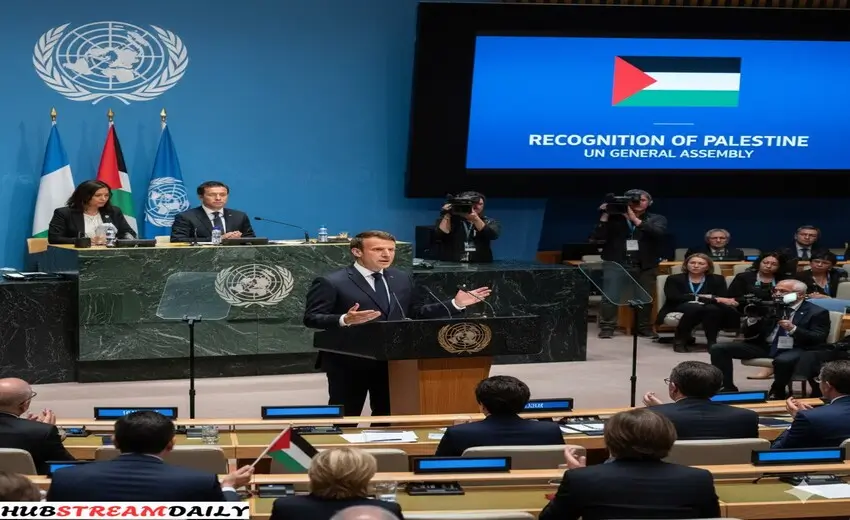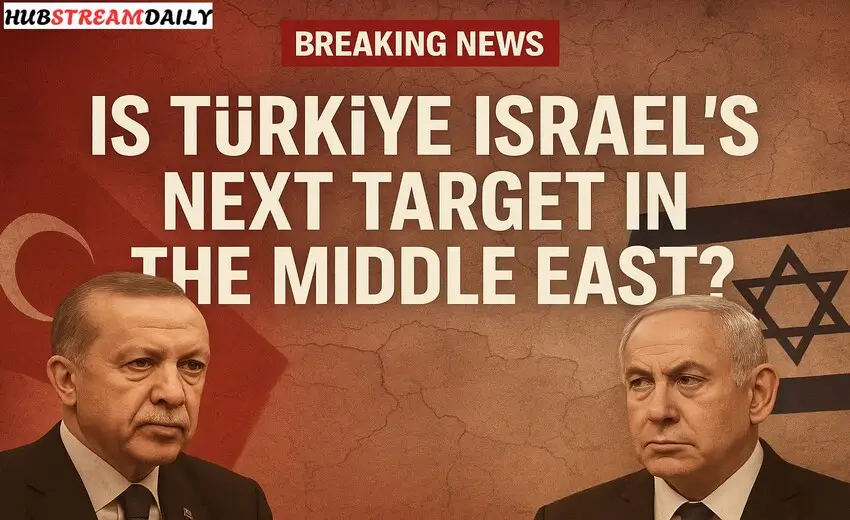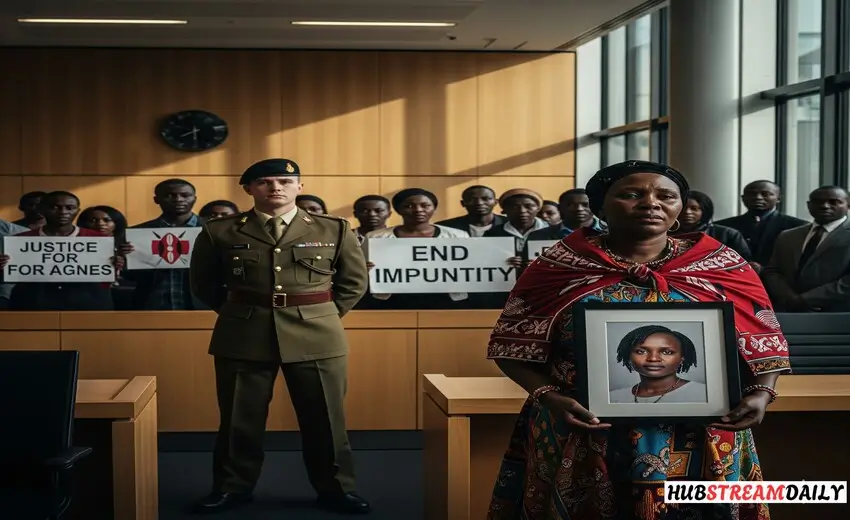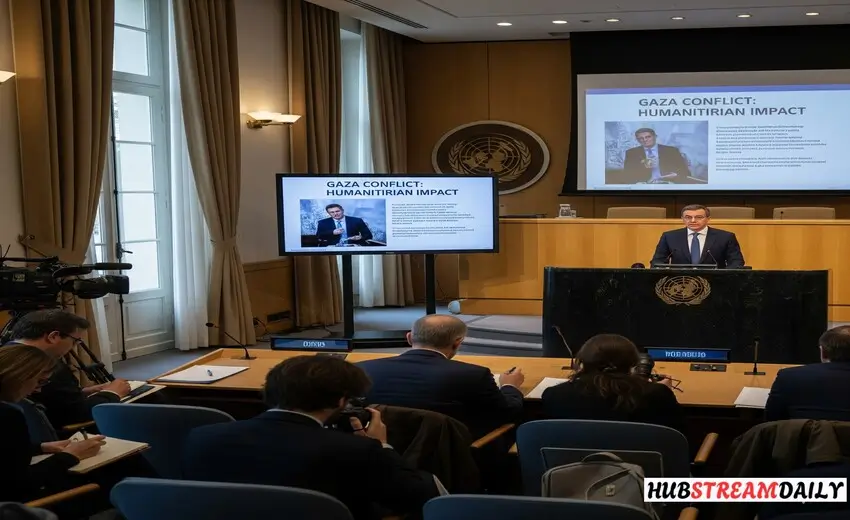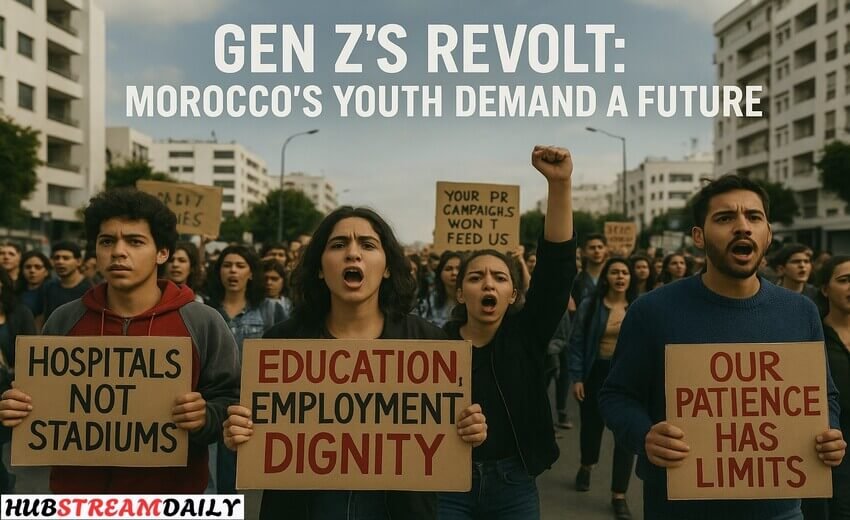
RABAT, MOROCCO — What is being hailed as a “turning point of the generation,” tens of thousands of young Moroccans, mostly from Generation Z, have packed city streets all over the country, airing their discontent with the stagnation of the economy for years, increasing the cost of living, and seeing that there is a gap between government spending and the needs of citizens.
The largest synchronized demonstrations of Morocco’s occurrence in over ten years have been the result of not one single event but a long-standing grievance with the youth, who say that their futures are being taken away right under their noses. The protests have spread from Rabat, the capital, to Casablanca, where the economic activity is concentrated, and Marrakesh and Fes, two cultural centers of the country.
📣 “We Want a Government That Listens, Not One That Performs”
The desires of the protestors are as straightforward as they can get: stop the obsession with prestige projects such as international sports events and luxury infrastructure, and start investing in human capital. One can get the theme from the placards and chants which ranged from “Education, Employment, Dignity” to others.
- Slogans seen across the protests included: “Hospitals, not Stadiums” “Your PR Campaigns Won’t Feed Us” “We Are the Voice of the Future” “Our Patience Has Limits”
- “Hospitals, not Stadiums”
- “Your PR Campaigns Won’t Feed Us”
- “We Are the Voice of the Future”
- “Our Patience Has Limits”
“This is not about politics; it’s about survival,” said 23-year-old student activist Aya Bensalah, who marched in Marrakesh. “We have had enough of being told to wait while corruption is at its peak, and our necessities are overlooked.”
📉 The Economic and Social Pressures Behind the Movement
Based on the latest statistics from the Haut Commissariat au Plan (HCP) of Morocco:
- Unemployment among young people is at 32.5%, which is twice the average for the whole country.
- Over 48% of Moroccan graduates are jobless one year after they complete their studies.
- The price of living went up by more than 11% since 2021, mainly in the areas of housing, fuel, and food staples.
- The amount of public money for education is still very low – only 4.4% of the country’s GDP, which is below the average of the region.
Numbers mean a lot to Gen Z Moroccans; they are not just statistics—they represent their daily fight with rent, job-hunting, and at times, the decline in their mental health. The increase of “NEET” children, youth (Not Employed, Educated, or Trained); The phenomenon has grown to such a level that the number of affected youth is estimated to exceed 1.5 million in some cases.
🏟️ Public Spending Priorities Under Scrutiny
One of the main reasons for unrest among the protesters is how Morocco spends money on prestige projects, for example:
- Applications for staging global football competitions, including the FIFA World Cup 2030.
- Costly beautification projects in the downtown areas of cities.
- The hosting of significant diplomatic or cultural events.
Despite these endeavors attracting the attention of the international community, opponents argue that the projects’ profits go to a tiny wealthy group while the rest of the country, which is already facing severe inequalities, are left behind.
Dr. Karim El-Maati, an economist at Hassan II University, explains:
“It’s just that these investments are not bad in themselves, but it’s a very different story with the present situation. When the youth can neither find jobs nor afford houses, then spending an enormous sum on the construction of stadiums, looks like the last thing an administration that cares should do.”
🧠 The Role of Social Media: #GenZRevolt Trends Nationwide
Unlike previous protest waves, this movement is digitally native.
Besides that, social media such as TikTok, Instagram, and X (formerly Twitter) played a great part not only in the organizing of the protests but also in sharing the real-time updates and spreading the viral videos of officials being confronted by angry citizens.
Hashtags like #GenZRevolt, #MoroccanYouthSpeak, and #OurFutureNow have trended across the Maghreb region.
These are some of the viral moments:
- On-air confrontation between a 21-year-old and the local governor over the state of his school is one viral moment.
- Videos showing new stadiums next to old hospitals being filmed simultaneously without any commentary allowing viewers themselves to draw comparisons is another viral moment.
- University students can be seen sitting quietly with their laptops and books during a demonstration for better education policies in a third video of viral moments.
🏛️ Government Response: Dialogue or Delay?
The Moroccan government reacted cautiously, giving official statements that acknowledged the protests but suggested minimal if any changes.
Prime Minister Aziz Akhannouch quoted:
“The government respects the right to peaceful demonstration and is actively listening to the concerns of young citizens. We will increase consultations with youth organizations and review upcoming budgets.”
Those in the streets answering back year after year are saying: “Empty promises are what these words are, after long years of waiting.”
On the one hand, the Ministry of Youth and Culture declared that it intends to establish a national youth dialogue platform for engagement and on the other, the organizers expressed doubts. Protest leader Soufiane Khalil said, “We have been promised this several times already. Dialogue without accountability is just a diversion.”
🌍 A Regional Perspective: Is Morocco the Start of Something Bigger?
One idea raised by experts is that the events in Morocco might lead the youth of the rest of North Africa, MENA region as this area is also filled with young people struggling.
Based on the 2025 Arab Barometer data:
- In the region, 76% of the youth reported that they do not trust their governments.
- 68% expressed their willingness to move abroad if they had such an opportunity.
- The highest concern for respondents aged 18-30 was ranked as unemployment and corruption.
“We are on the brink of a demographic revolution—the youth who are adept with digital tools, connected to the world, and, by the same token, quite discontented,” political analyst Rim Haridi states. “If governments do not change their ways, what we shall witness will be the consequences of the impacts that Morocco’s will reverberate.”
📌 Not Just a Protest — A Movement
Compared to the previous uprisings, this Gen Z-led movement is different in its decentralized nature and, consequently, more extensive inclusivity as a result of which it unites not only the students but also the young professionals, unemployed youth, and even older citizens who are in solidarity. It purposely shuns partisan politics in favor of addressing systemic issues.
The protestors at the demonstrations have built community kitchens, legal aid groups, and mental health support circles as a way of emphasizing that this is about building an alternative future, not just rejecting the current one.
“This marks the early days of a fresh and different civic culture taking place in Morocco,” claims Dr. Benyahia, a sociologist from Mohammed V University. “Gen Z is not only demanding immediate accountability from spending but also from values.”
🛑 Risks and Uncertainties
Although the demonstrations have remained mainly peaceful, the possibility of severe reactions has been a source of anxiety that has been voiced more and more. Extremely cautious in their approach, human rights groups have called on armed forces not only to refrain from violence but also to enter into a real dialogue with the protesters.
Moreover, the great ensemble of professionals linked to the rights of humans and including staff from the European Union and the United Nations who are at the ground, have acknowledged the correctness of the young people’s demand for peaceful protests. They have asked the Moroccan administration to sort out the root causes of the issue.
🔮 What’s Next?
The government will be kept on hold as the weekly protest continues, the first point of the list made public by the organizers being:
- To bring out a national budget that is more centered on primary education, healthcare, and creating jobs.
- To pledge monthly youth town hall meetings being held in every big city.
- To present a university reform plan along with rental control targeted at students and young workers.
If these requests are ignored, the protests could potentially ignite into a powerful national movement that would persist over time and that might even be compared with the 2011 February 20th protests during the Arab Spring.
🧾 A Generation at the Crossroads of Change
Protests led by Gen Z and occurring in Morocco are a demand for more than a mere relief of the economic pain. They embody a shared call for changes that go beyond the surface level by a collective body.
This is a globalized, internet-savvy generation that dares to counter the obsolete governance structures that lie at the heart of international prestige at the expense of Morocco’s people and social well-being.
The list of their complaints is quite detailed. Among such problems are youth unemployment that has gone out of control, education that is almost dying from lack of funds, rising prices for living, and a severe shortage of housing. These conditions have nurtured a storm of anger. The offshoots of these issues that come to be with government spending on the construction of stadiums and holding of international events make the gap not just political but also profoundly personal.
This social force stands out by its method of organizing and by its inclusive and visionary nature. The movement, nonviolent and respectable as it is, represents an aspiration to develop that the call is not yet very strong for— a Morocco that allocates as much to the people it invests in abroad. This youth revolt, buoyed by mass support, powered by social media, and equipped with well-articulated demands, may well be the onset of a new era in Moroccan civic life.
The government always sees the way ahead like this: either taking a chance with the reluctant generation and hence falling into the traps of them becoming totally alienated from you or willingly choosing to listen, interact with them, and carry out reforms.
As the protests escalate, the world spirits its gaze upon these events and Morocco’s destiny may indeed be authored by the bravery and resolution of its youngest citizens.

